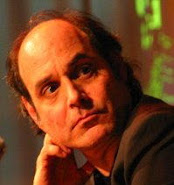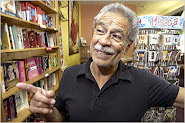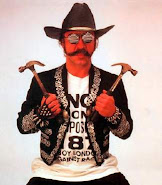
Lesson plans created by Claudia Treviño García M.A., M.Ed & Doctoral Student
Ph. D. Program in Culture, Language and Literacy
Division of Bicultural-Bilingual Studies
University of Texas at San Antonio
University of Texas at San Antonio
This biography and photographs were found at the following link:
About John Bonifaz
John Bonifaz is a dedicated leader who has spent years working with citizens across the country to protect the right to vote and to broaden citizen participation in the democratic process. In 1994, John founded the National Voting Rights Institute, based in Boston, and, after directing the organization for a decade, he now serves as its general counsel. NVRI today is a prominent legal and public education center committed to preserving the right of all citizens to vote and to participate in the electoral process on an equal and meaningful basis. Since founding NVRI, John has been at the forefront of many of the key voting rights struggles facing the nation today.
Some highlights of his work at NVRI include: Leading the fight in the courts for presidential candidates Michael Badnarik and David Cobb in their demand for a full recount in Ohio of all of the votes cast for President in the 2004 general election. Defending the Massachusetts Clean Elections Law, which was passed overwhelmingly by the voters of the Commonwealth in 1998. John led the effort to challenge the Massachusetts legislature's refusal to fund the law and NVRI won a landmark ruling from the Massachusetts Supreme Judicial Court, forcing the state to provide the necessary funds to all qualified candidates running in the 2002 state elections.
Working to overhaul the nation's campaign finance system by defending mandatory campaign spending limits, public financing of elections, and other important campaign reforms. John and NVRI are pressing for a US Supreme Court review of a 1976 ruling which equated money with speech and sanctioned today's system of unlimited campaign spending
Working to overhaul the nation's campaign finance system by defending mandatory campaign spending limits, public financing of elections, and other important campaign reforms. John and NVRI are pressing for a US Supreme Court review of a 1976 ruling which equated money with speech and sanctioned today's system of unlimited campaign spending
John has led a challenge to today's exclusionary system on voting rights grounds, linking the movement for change in the way we finance our elections to earlier civil rights struggles.
In 1999, in recognition of his path breaking work with the National Voting Rights Institute, the John D. and Catherine T. MacArthur Foundation awarded John with a prestigious MacArthur Foundation Fellowship.
In 1999, in recognition of his path breaking work with the National Voting Rights Institute, the John D. and Catherine T. MacArthur Foundation awarded John with a prestigious MacArthur Foundation Fellowship.
In addition to his leadership of NVRI, John has also been at the forefront of opposing the Bush administration's war in Iraq. In February and March 2003, John served as the plaintiffs' lead counsel in John Doe I v. President Bush, a constitutional challenge to President Bush’s war against Iraq absent a congressional declaration of war or equivalent action. John represented a coalition of US soldiers, parents of US soldiers, and Members of Congress (led by Representatives John Conyers, Jr. and Dennis Kucinich) arguing that the president's planned first-strike invasion of Iraq violated the War Powers Clause of the US Constitution.
John is the author of: Warrior-King: The Case for Impeaching George W. Bush (NationBooks-NY, foreword by Rep. John Conyers, Jr., January 2004), on the illegality of the Iraq war. The book presents an accounting of the John Doe I v. President Bush case and its meaning for the United States Constitution. He has also written numerous articles on the war and on the fight for democracy here at home which have appeared in publications such as The Boston Globe, The New York Times, The Los Angeles Times, TomPaine.com, The Columbia Law Review, and The Yale Law & Policy Review. John is also a co-founder of AfterDowningStreet.org, a national coalition of veterans' groups, peace groups, and public interest organizations seeking a formal congressional investigation into whether President Bush has committed impeachable offenses in connection with the Iraq war. The coalition, launched in May 2005, focuses on the new and compelling evidence revealed by the release of the Downing Street Minutes, showing that the President may have engaged in a conspiracy to deceive and mislead the United States Congress and the American people about the basis for sending the nation to war.
John continues to maintain a private practice with his father, Cristóbal Bonifaz, which specializes in international human rights and environmental law cases. John and his father serve as co-counsel for thousands of indigenous people living in the Ecuadorian and Peruvian Amazon in an ongoing case against the Texaco oil company for the company's environmental destruction of their homeland. John was instrumental in launching a landmark case against the Unocal oil and gas company on behalf of Burmese villagers for human rights abuses connected with the company's construction of a major gas pipeline in Burma.
John has been active in social movements for change from a very young age. As a college student at Brown University, John worked to register thousands of voters, participated in the nuclear disarmament movement, and fought for the university's divestment from companies doing business in then-apartheid South Africa. After graduating from Brown, John served as the scheduler for United States Senator Edward M. Kennedy in his 1988 re-election campaign. While attending Harvard Law School. He has served as a leader of La Alianza, the Latino law students association, and helped to lead the fight for faculty diversity at the school. . In 1990, John was one of 11 Harvard Law students who, along with a coalition of student groups, sued the school for discrimination in the hiring of its faculty.
John is the author of: Warrior-King: The Case for Impeaching George W. Bush (NationBooks-NY, foreword by Rep. John Conyers, Jr., January 2004), on the illegality of the Iraq war. The book presents an accounting of the John Doe I v. President Bush case and its meaning for the United States Constitution. He has also written numerous articles on the war and on the fight for democracy here at home which have appeared in publications such as The Boston Globe, The New York Times, The Los Angeles Times, TomPaine.com, The Columbia Law Review, and The Yale Law & Policy Review. John is also a co-founder of AfterDowningStreet.org, a national coalition of veterans' groups, peace groups, and public interest organizations seeking a formal congressional investigation into whether President Bush has committed impeachable offenses in connection with the Iraq war. The coalition, launched in May 2005, focuses on the new and compelling evidence revealed by the release of the Downing Street Minutes, showing that the President may have engaged in a conspiracy to deceive and mislead the United States Congress and the American people about the basis for sending the nation to war.
John continues to maintain a private practice with his father, Cristóbal Bonifaz, which specializes in international human rights and environmental law cases. John and his father serve as co-counsel for thousands of indigenous people living in the Ecuadorian and Peruvian Amazon in an ongoing case against the Texaco oil company for the company's environmental destruction of their homeland. John was instrumental in launching a landmark case against the Unocal oil and gas company on behalf of Burmese villagers for human rights abuses connected with the company's construction of a major gas pipeline in Burma.
John has been active in social movements for change from a very young age. As a college student at Brown University, John worked to register thousands of voters, participated in the nuclear disarmament movement, and fought for the university's divestment from companies doing business in then-apartheid South Africa. After graduating from Brown, John served as the scheduler for United States Senator Edward M. Kennedy in his 1988 re-election campaign. While attending Harvard Law School. He has served as a leader of La Alianza, the Latino law students association, and helped to lead the fight for faculty diversity at the school. . In 1990, John was one of 11 Harvard Law students who, along with a coalition of student groups, sued the school for discrimination in the hiring of its faculty.
Following his graduation from Harvard Law School in 1992, John moved to Washington, D.C., to serve as the staff attorney for the Center for Responsive Politics. He moved back to Massachusetts in 1994 to start the National Voting Rights Institute and to join his father's law practice. John and his wife, Lissa Pierce Bonifaz, live in Jamaica Plain, Massachusetts. Lissa holds a doctorate in bilingual education and works as a professor at Lesley University in Cambridge, where she teaches in the Language and Literacy Division of Lesley's School of Education.
John's parents, Deirdre and Cristóbal, live in Conway, Massachusetts, and his sister Margarita lives in Northampton. Deirdre grew up in nearby Whately, Massachusetts, and, during John's childhood, she founded and directed a national non-profit cooperative supporting low-income artisans across the country. Cristóbal emigrated to this country from Ecuador when he was sixteen and became a chemical engineer. He later became a lawyer while John was in high school. Margarita has worked tirelessly for the past fifteen years as a teacher in the Amherst public school system.

Lesson Plan Title :
Your Vote Counts
Level
9-12
TEKS Standards:
§113.31. Implementation of Texas Essential Knowledge and Skills for Social Studies, High School
(19) Citizenship.§113.31. Implementation of Texas Essential Knowledge and Skills for Social Studies, High School
The student understands the importance of effective leadership in a democratic society. The student is expected to:
(A) describe qualities of effective leadership
(24) Social studies skills
(A)The student applies critical-thinking skills to organize and use information acquired from a variety of sources including electronic technology. The student is expected to:
(A) Locate and use primary and secondary sources such as computer software, databases, media and news services, biographies, interviews, and artifacts to acquire information
(4)Writing/inquiry/research
The student uses writing as a tool for learning.
C) Compile information from primary and secondary sources in systematic ways using available technology
Pre-Instruction or Prerequisite Knowledge/Skills
Basic Internet search capabilities and basic writing skills, knowledge of Microsft Publisher
Lesson Duration
3-4 sessions, 1-2 hours each
Student may choose to do research outside of the classroom as well
Learning Location
Computer Lab, online, in the classroom, at home or in community library
Materials
Computers with Internet connection and printer, markers, pencil, magazines, glue, construction paper, printing paper
Objectives
The purpose of this lesson is to focus on the importance of voting. This lesson is designed to focus on our democratic responsibility as law-abiding citizens, then hopefully all students will make it their civic duty to impose their right to vote. Also, this lesson is designed to empower students to speak with confidence and authority.
Task 1
Students will be able to conduct research in order to write a bibliography about John Bonifaz, MacArthur Fellow. Students will be able to type their bibliography and print a copy to use for future reference.
In their bibliography they can use the following guiding questions:
Who is John Bonifaz?
How did he get involved in voting rights?
Where did he study?
Why was he selected as a MacArthur Genius? How have his contributions benefited our nation?
The following links will provide you with information about John Bonifaz.
http://www.johnbonifaz.com/about
http://macarturos.blogspot.com/2007/09/biographies-of-latino-geniuses.html
Task 2
The students will review the voting process using the following link.
1. Students will work in groups of 3 to design a voting brochure for elementary students.
2. First, students will conduct research using the above link.
3. Students will begin the first draft of their brochure. This brochure must include illustrations or pictures. Teacher will hen provide feed back.
4. Edit brochure and turn in final draft for evaluation.
Task 3
1. Showcase photos of people elected due to the voting process. You can gather pictures by going to Google images and type in "voting". Save, these pictures, print and display in your classroom.
2. Ask students to share any experiences they have had with voting (going to the polls with their parents, in the media, etc.)
3. Record their responses on a web to capture every students' input. Label web:
My Knowledge about voting
4. Discuss why it is important to vote. Some guiding questions can be:
What are some of the issues that people have voted on either in you local community, state or nation?
Who can vote and how old do you have to be to vote?
When do people go out to vote? Give examples.
Why is it important to vote?
Task 4
Students will be given the task to brainstorm what they think are character traits of a good leader. This is to help them become aware of what to look for in a person when they are voting.
(Examples: Honest, Respectful, Responsible,Giving)
1. In groups of 4 they will come up with a list of 5 traits minimum. They are to discuss why they chose these traits and be prepared to report their words to the rest of the group.
2. One person will be designated the speaker of the group, two the recorders, and one the timekeeper. Allow the students at least 15 minutes to work on this assignment.
3. Following presentations students will make a collage using magazine clippings that show these characteristics. These will be done individually.
Task 5
Use the following webquest link to provide a guide to your next activity...class elections. I found this through a simple search. You ca create your own webquest by going to:http://cte.jhu.edu/techacademy/web/2000/poling/webquesthome.html
This webquest serves as guide for you to help get organized to prepare students to hold class elections and/or run for class office.
You can create your own webquest by going to the following link:
http://www.instantprojects.org/webquest/main.php

Evaluation
The teacher may use the rubrics to assess students or other forms as she/he deems appropriate. The following link can help you design your own.
http://rubistar.4teachers.org/index.php?screen=NewRubric§ion_id=3#03
About the Author
Claudia Treviño García is a first generation Mexicana/Chicana. She has a B.A. in Interdisciplinary Studies with Bilingual/ESL Education Certification and an M.A. In Bicultural-Bilingual Education, both from the University of Texas at San Antonio (UTSA). She taught 13 years in the San Antonio Independent School District, 10 of which were at Storm Elementary, a Dual Language Campus. She is currently in her second year of her doctoral studies at the UTSA. Her research interests include, teacher retention, pre-service teacher preparation, induction year support and teacher ethnic identity. She is currently the Assistant Director for the Academy for Teacher Excellence. She currently lives in San Antonio, Texas with her husband Gus and their three children Gustavo (18), Carolina (17) and Jonathan (12).






No comments:
Post a Comment